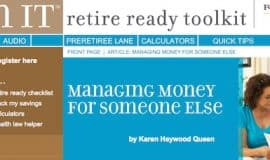Portfolio
Filter by Category
Filter by Date
Search
I have been a professional freelance writer for more than 20 years and have written for a variety of publications and companies including Better Homes and Gardens, GE, Intel and The Washington Post. If you’re looking for high quality, professional writing tailored to you and your style, I deliver outstanding results.


Climb a Life Insurance Ladder and Save
People who invest in certificates of deposit are used to the concept of “laddering.” They buy CDs that mature on different dates to avoid being locked out of their cash or locked into a low interest rate for too long.
Compare life insurance quotes from reputable insurers
You can build a similar ladder with life insurance, planning extra coverage for when you’ll need it the most and tapering off coverage when your needs won’t be as great. This approach can save you money.
You can ladder life insurance two ways:
- Buy policies with different term lengths at the same time: for example, one policy with a 30-year term, one with a 20-year term and one with a 10-year term.
- Buy one policy now and additional policies later. You might buy a 30-year policy early in your career or marriage and ladder on a 10- and/or 20-year policy during your peak earning and debt years, after you have children, buy a house or incur other financial obligations
Life insurance needs can go up and down
Laddering is great because most people probably don’t need much life insurance at the start of their careers, says Mike Piper, a certified public accountant in Manitou Springs, Colorado.
“After they get married, have kids and/or get a mortgage, suddenly there is somebody who would be in financial trouble if they died. So they need life insurance,” adds Piper, the author of several personal finance books and blogger at ObliviousInvestor.com.
Later, that need for life insurance should decrease as your savings grow, your debt balances shrink and children leave the nest. By reducing the amount of life insurance during that stage of life, a policyholder could save hundreds of dollars a year in premiums, Piper says.
Potential sources of savings
Laddering shorter-term policies not only is a good way to bulk up coverage during key times of your life, but it also saves on premiums, says Greg Sanders, founder of Peachtree Insurance Advisors in Marietta, Georgia.
The annual premiums on 20-year and 10-year policies would be lower than for a 30-year policy in the same dollar amount because coverage on the 10- and 20-year policies ends while the policyholder is younger and presumably in better health, he explains.
At the same time, big policies don’t necessarily bring big savings. Buying one $5 million, 20-year policy instead of two $2.5 million, 20-year policies saves only $85 a year, Sanders says.
Laddering example No. 1: Lou, 30
Here’s how laddering would work for a 30-year-old man we’ll call “Lou.” He is a nonsmoker in average health and lives in St. Louis.
If Lou were to buy a 30-year, $1.5 million term-life insurance policy, he might pay $2,050 a year in premiums, Piper says.
But with laddering, Lou might buy:
- One 30-year, $500,000 policy with an annual premium of $730.
- One 20-year, $500,000 policy with an annual premium of $475.
- One 10-year, $500,000 policy with an annual premium of $310.
Those premiums add up to $1,515, saving Lou $535 a year during the first 10 years for the same $1.5 million in coverage, Piper says. That’s $5,350 for Lou, in addition to potential interest or investment returns.
As the two shorter policies expire, after 10 and 20 years, Lou would save even more because he would no longer be paying those premiums. But he would have less coverage.
Too young to ladder?
An argument might be made against life insurance laddering for people in Lou’s younger age bracket.
“If you’re 27 years old and need $1 million worth of insurance, just buy a 30-year term policy,” says Sanders. “Don’t try to split it up. You might save a little bit of money, but the savings won’t be worth it.”
He adds: “If you get into your 30s and 40s and don’t need that much coverage, you can always call and reduce your death benefit, and the insurance company will reduce the premium.”
But the laddering strategy can work well for those in their mid-30s and older who are buying life insurance for the first time, Sanders says.
Laddering example No. 2: Stan, 43
Consider the example of another consumer we’ll call “Stan.” He also lives in St. Louis, is 43, doesn’t smoke but is overweight and takes medication for blood pressure and cholesterol. He also would be considered in “average” health, Sanders says.
Buying a 30-year, $1 million life insurance policy could cost Stan $3,221 a year, he says.
Instead, Stan could use laddering to purchase:
- One 30-year, $250,000 policy with an annual premium of $912.
- One 20-year, $750,000 policy with an annual premium of $1,522.
Those add up to annual premiums of $2,434, which would save Stan $787 a year for the same $1 million in coverage during the first 20 years. That’s a total savings of $15,740, which Stan would enjoy on top of any interest or investment gains, Sanders says. But, like Lou, Stan would have less coverage in the later years.
But needs may not change
A laddering plan presumes that life insurance needs will shrink, but unexpected issues often arise — such as boomerang children returning to the nest, a mortgage refinance that increases housing debt or the purchase of a second home, says Craig DeSanto, senior vice president in charge of life insurance for New York Life.
“What they initially thought they would need ends up changing over time,” he says. “If you’re going to execute a strategy like this, it’s really important that you buy term insurance from a carrier that allows conversions to permanent insurance to give you the option to keep the policy in place if your needs have changed.”
If you find yourself wanting to replace laddered policies with longer-term coverage that’s potentially more expensive, you might reduce your benefit to save on premiums, DeSanto says.
Don’t forget your policies
Let your heirs know about your life insurance ladder: how many policies you have and with what companies. “It’s important that they know all of the policies you have in place,” Piper says.
Finally, don’t forget you have more than one policy when it comes time to pay the bills on them. “You wouldn’t want to let one policy accidentally lapse by missing a premium payment thinking, for instance, that you already paid the life insurance bill last month,” he says.

Money Lessons I Learned from a Medical Bill SNAFU

Assets Online? Plan Your Estate for the Digital Age
Help heirs find your paperless accounts after your death

“It used to be when someone passed away, there were all these clues — a paper trail around the house about what the deceased person owned and owed,” says Karin C. Prangley, an estate attorney at Krasnow Saunders Kaplan & Beninati in Chicago. “Now there is no more paper trail. All of that is digital. It’s a big deal because it’s hard to get at that digital information.”
Ignorance can be costly. “If you can’t get into this person’s email account, if you have no idea where this person banks … the [deceased] person may have a million dollar account at Fidelity, but you just don’t know, says Prangley.
“Maybe the person had an insurance policy, maybe the person had an online store selling a specialized product, maybe there was some sort of business you as the heir don’t know about. The money goes right to the grave.”
Not having access to the deceased’s online accounts or email alerts could mean that bills normally paid online go unpaid. Since the estate is responsible for existing debt, missing those payments could cause headaches as you straighten out the problem, says Deborah L. Jacobs, author of “Estate Planning Smarts.” “If you don’t find credit card accounts quickly and bill paying is delayed and finance charges are assessed, you can most likely get the credit card companies to forgive the finance charges,” Jacobs says. “But you may have to fight them.”
The opposite situation is also a problem. Recurring bills that are on auto-pay may continue to be paid even after the product or service is no longer needed.
“We’ve seen instances where someone has been dead for years and they’re still paying for The Economist online,” says Jacobs.
Finding financial accounts
Without a list of financial accounts, finding them can be tricky, but there are steps you can take. The easiest: check the person’s wallet, pocket, desk and drawers for the receipts, Jacobs says. “Even if you’re doing almost everything online, those receipts may be in their pockets.”
To find open accounts, such as credit cards that aren’t regularly being used and generating receipts or bills, you can get a copy of the deceased person’s credit report from one or all of the three consumer credit reporting agencies, TransUnion, Experian and Equifax. But you’ll need documentation, agency representatives say.
For example, all three require a copy of the death certificate and proof that you have power of attorney or are executor of the estate.
Beyond banking
In addition to banking and investment accounts, many people access their airline, hotel and other rewards programs online, says Glenn C. Williamson, CEO and founder of WebCease Inc. in Portland, Ore., which helps heirs track down those digital assets. “I personally have half a million Hyatt points, valued at $35,000 to $45,000,” Williamson says.
… Maybe there was some sort of business you as the heir don’t know about. The money goes right to the grave.
— Karin C. Prangley, Estate planning attorney
The potential dollar loss goes beyond financial accounts and rewards programs to items you may not think of immediately, Prangley says. “What’s the cost of losing a lifetime of photos? What happens to unique weapons held by a World of Warcraft master? What about wins in offshore, online poker accounts?”
North American respondents to a survey by security giant McAfee valued their digital assets at an average of $54,722 with listed assets including music downloads, photos, emails, financial and health records, career information and contacts, and hobbies and creative projects.
Even a great-grandfather may have digital assets if he’s been online, says Williamson. “We did one 91-year-old guy who didn’t even have an email address and he had hotel points,” he says. Another man in his 80s had a separate Facebook account for selling RVs — news to his family, Williamson says.
Finding assets online can be time-consuming. First, heirs have to know an account exists. Second, they have to be able to gain access to that account via usernames and passwords.
“People are grieving,” says Jacobs, the author. “This is adding an extra hardship.”
Williamson estimates it took him 25 hours to find his mother’s online accounts after she passed away, which gave him the idea for WebCease. WebCease routinely searches about 60 nonfinancial online accounts, including photography sites such as Flickr, hotel and airline rewards programs, social media sites and e-commerce sites including Amazon, PayPal, Netflix and eBay.
WebCease researchers will personalize the search and look for additional accounts when necessary, Williamson says. For instance, in the case of the RV enthusiast, they searched various campground websites to see if the deceased had a membership with valuable rewards or resale potential. “We wouldn’t typically search on those, but when my researchers make a correlation they will go further than our standard list.”
WebCease lets its clients know what it finds, and then gives them each site’s policies and information on how to transfer the digital assets and how to shut down the account, Williamson says.
Rescuing vital records
Passwords are the next hurdle. Even if you as the executor or heir have written permission from the deceased account holder to access accounts, without the proper passwords, online providers may not give you the content, says Hazel Sanchez, estate planning attorney at the Law Offices of Rhonda H. Brink in Austin, Texas.
Some online providers, if they were to find out the account holder is deceased, would simply close the account and delete all the information on it.
— Hazel Sanchez, Estate planning attorney
“Each one has different procedures,” says Sanchez. “Some online providers, if they were to find out the account holder is deceased, would simply close the account and delete all the information on it.”
Sanchez recommends that if you do have access to usernames and passwords, you print out hard copies of financial information so that even if the accounts are later deleted, you’ll have the information you need.
Technically in these cases, you could be liable for unlawful access of data, but it’s not likely an heir would be prosecuted. “They talk about liability of unauthorized access, but nobody ever enforces it,” Sanchez says. “It’s more important for the fiduciary to gain control of assets and prevent deletion of information before anything happens.”
Sanchez says a little pre-emptive action can prevent any problems related to unauthorized access. “We recommend will provisions that give the executor authority to access the deceased’s digital assets and accounts,” she says.
Shutting down fraud
Eventually, though, you’ll want to make sure you close accounts for security reasons. The identities of nearly 2.5 million people are misused every year to apply for credit, according to a 2012 study by ID Analytics.
“You don’t want mom’s profile out there,” says WebCease’s Williamson. “When you die, it’s public record. It’s so much easier to steal a deceased person’s identity.”
When you die, it’s public record. It’s so much easier to steal a deceased person’s identity.
— Glenn C. Williamson, CEO and founder of WebCease
To prevent fraud and identity theft, notify credit card companies and other lenders that the person has died, says Maxine Sweet, president of public education at Experian. “They will report the deceased status to the credit reporting companies and it will automatically become part of the file, preventing fraud,” she says. “If the deceased was receiving Social Security benefits, the Social Security Administration also should be notified and [SSA] will also report that information to us.”
Even if you’re not looking for open accounts, you still should contact the credit reporting agencies with a copy of the death certificate, so the credit file can be updated, says Clifton O’Neal, vice president of corporate communications at TransUnion.
You may also want to contact the Direct Marketing Association to have the deceased removed from marketing mailing lists, Sweet says. “Having those arrive in the mail can be painful for the relatives,” she says.
Planning your digital afterlife
You can prevent many of these hassles for your own heirs by making preparations now. A few simple measures can lessen or eliminate the need for your loved ones to become online sleuths after you’re gone.
Keep a snail mail trail
Even if you do business mostly online, elect to receive some paper statements so your heirs will find out about your accounts from mail delivery, says Jacobs, the author. “Even though I favor cutting down on the paper in our lives, this is not the place to do it,” she says.
Consolidate your accounts
Combining financial accounts or at least moving assets to a small number of providers makes them easier to keep track of, Jacobs says. “I know of a number of elderly people who have certificates of deposit at 50 different banks,” Jacobs says.
Finding the records could be sheer luck. Jacobs and her husband went to one bank her mother-in-law used to cash in one of her CDs and the bank officer told the couple she had a second CD that they hadn’t known about.
List account information
Make a list of accounts with the name of the financial institution, account number and how it’s titled and put it in a folder if you’re comfortable having that information at your house, Jacobs says.
If not, make one list of user IDs and a separate list of passwords, Sanchez suggests. Give each list to a different person and tell your executor those people’s names so the two lists can be put together when you pass away, she says.
She acknowledges that keeping the list up to date could be time-consuming, but says it’s necessary. “We think it’s very important for everybody to make a list inventory of what they have,” Sanchez says.
Name an online executor
As you make that list of user names and passwords, consider naming an online executor, who could be separate from your overall estate executor, says Prangley, the estate attorney. An online executor would identify and provide information to your family about your online accounts and digital assets and they could sell what might be useful to others, she says. Further, the online executor could delete any emails or other online communication that might hurt your family members, she says.
“Some people have separate online lives,” she says. “Your executor might delete your online flirting.”
Additional resources
An industry has cropped up to cater to today’s digital estate planning needs. For example, Eterniam, founded in 2013, preserves all your digital assets — photos, videos, documents and content from social media sites. You can bequeath each asset to chosen beneficiaries.
The Digital Beyond, created by John Romano and Evan Carroll, is a think tank for digital death and legacy issues. Its website, thedigitalbeyond.com, maintains a list of online services designed to help you plan for the future of your online content.

Managing Money for Someone Else
Maybe your dad just had a stroke and can no longer handle his money. Maybe your mom’s decline has been gradual, but you realize she’s not keeping up with her bills.
Managing your own finances is tricky enough. But when you become the financial agent handling a relative’s finances, you’re navigating a minefield of legal, financial, and relationship issues. Here’s what you need to know.
About 22 million people age 60 or older have designated someone to make decisions for them as an agent under a power of attorney (POA) document. Millions more have court-appointed guardians or other fiduciaries, according to the Consumer Financial Protection Bureau (CFPB), Washington, D.C.
“It’s a big responsibility,” says Naomi Karp, project manager for the CFPB’s guides to managing someone else’s money.
“When people are given legal authority to manage someone else’s money, it’s important for them to understand their legal duties. They’re standing as a bulwark between the people in their charge and people who want to rip off vulnerable older people.”
As a fiduciary, you must observe four basic rules:
- Act in the person’s best interest.
- Manage money and property carefully.
- Keep money and property separate from your own.
- Maintain good records.
There also may be issues related to Medicaid eligibility for nursing home care. At risk are the elderly person’s assets and your family relationships. Even if you’re only managing money on an unofficial basis, these are good guidelines to keep in mind.
Obtain power of attorney
If you don’t have a POA in place for your aging parents or relatives (or yourself), get one to avoid the need for court-appointed guardianship or conservatorship in the future.
As a court-appointed guardian or conservator, “You have to file these horrendous annual accountings that can take hundreds of hours,” says Evan Farr, of the Farr Law Firm in northern Virginia. You will have to file some documents with POA but it’s not nearly as time consuming.
But although you can get a POA document free or cheap online or from office supply stores, that upfront savings may cost you and your loved one in the long term. “Not all power of attorney (documents) are created equal,” Farr says. A good POA must have asset protection authority with the ability to make unlimited gifts, create trusts, take money out of trusts, and terminate trusts, he says.
Consult an eldercare attorney
Your next step is to consult an attorney. “Go to a really good eldercare lawyer in the same state as your parent—state laws vary quite a bit,” says Roxanne Nelson, of Bellingham, Wash., who shares POA responsibilities with her brother for their ailing mother in Florida. “It’s worth the investment. We paid $10,000 up front and it’s been invaluable.”
Protect assets
With the proper legal measures in place, the person in need of care can legally and ethically qualify for Medicaid-funded nursing home care without spending assets down to near zero. “Medicaid is the most complex area of law in existence,” Farr says. “It’s a minefield. If people don’t check every box properly, it can blow up and cause huge financial problems.”
An eldercare attorney will help you with what’s called Medicaid asset protection legally protecting your elderly parents’ assets from the high cost—for example $12,000 to $14,000 a month in northern Virginia—of nursing home care, enabling you to legally and ethically file for Medicaid on their behalf, says Farr, one of only about 450 certified eldercare attorneys in the country. In perspective, the cost of an attorney’s help is about the same as a month or two of nursing home care paid out of pocket.
If you have assets that you want to protect, it pays to plan ahead. Farr says the cost of hiring an eldercare attorney to shield assets five years or more from when the person needs nursing home care is $5,000 to $7,000, and 100% of assets can be protected.
The cost of hiring an eldercare attorney to shield assets in a crisis situation—at the time nursing home care is needed—is $12,000 to $25,000. In the case of a married couple, usually 100% of assets can be protected. For an individual, 40% to 70% of assets can be protected.
“Seventy percent of people are going to end up in long-term care at some point and they’re going to want to do Medicaid asset protection to shield their assets from the catastrophic expenses of nursing home care,” Farr says. “Most couples who don’t do Medicaid asset protection wind up going broke.”
Act in the person’s best interest
With a financial POA, you’re legally required to act in the person’s best interest—and that means putting your mom’s or dad’s best interests ahead of your own, Karp says. If you use your dad’s or mom’s money to buy a car to take him or her to doctor’s appointments but use the car more for your own errands, that’s putting your interests first, she says.
“Remember it’s not your money,” Karp says. “If you stray, you may go to jail.”
Manage money and property carefully
You have to avoid conflicts of interest—or even the appearance of a conflict—says Jan McCurdy, co-owner of Senior Care Management in Ewing, N.J. For example, if your son is mowing grandma’s yard for $75, get a written estimate from a local lawn care company. Then if someone—a jealous family member or judge—questions you, you can show the $200 estimate from the lawn care company.
“You have to account yearly to Social Security how that money was spent,” McCurdy says. “Adult children are always shocked to know they’re held to a fiduciary standard. It can be really devastating if you get accused of misusing someone else’s money.”
Keep money and property separate
No matter that you and your mom have always shared everything. Once you’re managing her finances, keep separate accounts.
“People put money into their [own] account just for ease of access and then they go to apply for Medicaid and realize this is big mess trying to figure out whose money is whose,” McCurdy says.
Maintain good records
You and your parents may have been flexible about taking turns to pay for a meal out, but those days are probably over, too. Whether you’re talking about a $50 meal or $5,000 to help with a grandson’s tuition, maintain a paper trail by keeping receipts, copies, or logs, for example. Karp says if your parent ends up seeking Medicaid eligibility for nursing home care, your state may “look back” to five years’ worth of records.
Avoid paying in cash. “We’re used to going to an ATM and doing business,” Karp says. “But then it’s going to be hard to account for what you did. It’s a good thing to have those records to show you did the right thing.”
Allow yourself time
Even with a good lawyer, dealing with these issues can take hours and hours, especially at first. “Be prepared,” Nelson warns. “When my mother broke her hip, my brother and I spent a week in Florida going to banks, filling out forms, talking to them in the nursing home. It was a lot of legwork. It was extremely time-consuming.”
Talk to the people at your parents’ credit union. They can help you streamline management of parents’ funds to comply with your fiduciary duties and keep things running smoothly at the same time.

McDonnell Case Reminds Me to Keep Spending in Check

The Sanderling Pampers All The Senses
Just driving up to the inviting cedar-shingled buildings of The Sanderling Inn on a sunny day in the off-season lowered my blood pressure. Down the hall, our room offered a loft, a bottle of Merlot for sipping, and a small kitchen just in case we tired of the dining possibilities on site.
Strolling around the grounds, I envisioned a massage in the outdoor gazebo, dipped my toe into the hot tub, and inhaled the scent of flowers. Back inside, we admired the sculptures of Grainger McKoy, Trailer McQuilken, and Gunter Granger and the National Audubon Society prints of birds. We lingered in a wood-paneled reading room where a fire burned brightly and hot tea, scones and three kinds of cookies and scones were laid out for afternoon tea. Good weather or bad, in season or out, this was a place to feel pampered.
But the beach beckoned on this unseasonably warm spring day. I grabbed a beach chair and my book and chose a spot on the nearly deserted sand. The water was calm but in the low 40s – too cold for swimming.
Spring is great, but visit again in the fall, invited Sanderling general manager Scott Brewton. Skies are still brilliant blue, the air is warm, the water is much warmer, the shops have started their sales and the tourists aren’t as thick as in the middle of the summer. But the chocolate chip, oatmeal and peanut butter cookies still await, along with the tea and scones.
“The weather is simply better in the fall,” Brewton says. “It’s that whole Indian summer thing. I personally was swimming in the ocean last October. It hasn’t cooled off yet.”
In the spring and fall, golfers enjoy lower rates and less crowded courses. The fish are still biting. Shoppers can hit the sales.
If it’s nature you want, it’s right here. Jog through the adjacent Audubon Society’s Pine Island Wildlife Sanctuary. While dining in the Left Bank restaurant, gaze out the windows at the herons, foxes and deer.
“To me, the typical profile of an Outer Banks guest is one who does enjoy the outdoors,” Brewton says. “The beauty of it is, everyone who comes here comes to be one with nature. But everyone has his or her own definition of being with nature. For some, it’s swimming in the ocean. For others, it’s kayaking. For some, it’s sitting in a beach chair reading a book. You can get an outdoor massage in the gazebo. I’m somewhat amused by the constant bragging rights of hotel chains about high speed Internet. I’ve been here almost eight months and I’ve never seen it on a comment card that we need faster Internet. We have the ability for guests to plug in their laptops. But people come here to unplug. It will all be there when you get back.”
My laptop was miles away. When the sun began to dip behind the dunes, it was time to work off the scones and cookies to make room for a gourmet meal. Watching the sun set over the Currituck Sound made the treadmill miles fly by in the well-equipped fitness center. The center offers weight machines, free weights, treadmills and bikes. Swimmers can get their laps in an indoor pool, no matter the weather, then relax in the whirlpool and gaze at the sound.
Diners may want to plan their meal to watch the sun set from The Left Bank restaurant. Be aware that this is a place where one Dresses for Dinner. Jackets are available for men who don’t have them. Other less formal dining options include The Lifesaving Station Restaurant and the Swan Bar and Lounge.
At The Left Bank, we chose a three-course meal – those with heartier appetites can choose five courses. After agonizing over the many choices, I opted for a beef carpaccio with shaved pecorino toscano, petite red oak and toasted brioche with a sherry vinaigrette. My companion chose seared Hudson Valley foie gras with warm banana nut bread, caramelized bananas and a mango lime relish. We savored each taste, eyes closed in ecstasy. For the second course, the slow roasted salmon with baby leeks, warm Yukon gold potatoes, grain mustard vinaigrette and greens topped my high expectations. My friend tried the venison loin wrapped in smoked bacon with sweet potatoes, porcini mushrooms and roasted shallots. Each bite brought a smile of pleasure. To finish the meal, we chose a molten chocolate torte with vanilla ice cream and chocolate sauce – a perfect coda to a symphony of fine taste.
After such an evening meal, many guests wouldn’t be up for the challenge of a big breakfast. We couldn’t resist the complimentary bakery basket with muffins, bagels, fresh fruit, fresh squeezed orange juice, spring water in a signature Sanderling bottle, trail mix and more – our incentive to rise and shine. Those who want something more or different can order a room service breakfast or dine in the restaurant.
More pampering awaits guests in the spa. A therapeutic massage will ease away any aches and pains still remaining. For something different, try a Scentao Massage or Sea Stone massage, both of which use warm, smooth sea stones.
I couldn’t resist those warm stones. They glided over my body or rested on my back, arms and legs while the therapist’s hands melted away more tension. Many people are so relaxed they fall asleep but stay awake if you can to savor the experience.
Afterward, a sugar scrub softened and polished my skin. A European facial cleaned and freshened my face. That combined with a replenishing, peach-colored masque took off a few years. A touch of foot reflexology – applying pressure to certain points on the feet that correspond to certain organs – relaxed me further.
Too soon, it was time to leave. I filled my Sanderling water bottle to the top and even now, just a sip brings back the memories of pampering and pleasure.




Fraud Alerts: Your Credit’s First (and Free) Layer of Security

The New Math: Working Through College May Not Pay Off

My New System For Making Sure my Minimum Payments Get Made

How I Financed Second College Degree, Balancing Work, Study & Family

Making Dollars and Sense of Financial Planner Designations

Fighting the Good Fight
Bullied To Death? Not Me — But I Understand
By Karen Haywood Queen
Every day in 9th grade, Portia, Samantha, Linda and Sarah teased me, shoved me, kicked me, pinched me and hit me during the 45-minute bus ride to and from school. That was year four of six years of bullying.
Bullying isn’t new. School children in 17th century France dueled, brawled, mutinied and beat teachers. In English public schools from 1775 to 1836, mutinies, strikes and violence were so frequent that schoolmasters occasionally sought assistance from the military, according to a 1998 paper from the Reason Public Policy Institute. In the 1700s, 1800s and 1970s, StopBullying.gov didn’t exist. There was no Bullying Prevention Awareness Month (October). Cyber bullying didn’t exist. School shootings weren’t part of the national culture.
Sixteen percent of school children say they have been bullied, according to a Clemson University study. Children at risk for being bullied are those who are underweight, overweight, wear glasses, wear different clothing, are new, perceived as weak or unable to defend themselves, depressed, anxious, have low self esteem, less popular seen as annoying, according to StopBullying.gov. But even 300-pound NFL football players are bullied.
I was skinny, smart, uncoordinated, short, flat-chested, had an ugly smile, wore glasses and dressed funny. I lacked social skills and had few friends. I was bullied from sixth grade through 11th grade.
Signs of Bullying
According to Stopbullying.gov, bullying includes teasing, name-calling, inappropriate sexual comments, taunting, threatening to cause harm, leaving someone out, telling other children not to be friends with someone, spreading rumors, embarrassing someone in public, hitting/kicking/pinching, spitting, tripping/pushing, taking/breaking someone’s things, making mean or rude hand gestures.
Every time I walked past his house, Bill hit me with a Frisbee. Gary spit on me. At school, Charlotte and other kids hit me and took my candy, gum and lunch money. Ray yelled IBTC (for itty bitty titty committee). In math class one day, Ellen mentioned gym class, showers and then said in a loud, clear voice, “I heard you were bald….beneath.”
Signs that a child is being bullied include unexplainable injuries, lost or destroyed possessions, frequent headaches or stomach aches, changes in eating habits, difficulty sleeping, frequent nightmares, declining grades, loss of interest in schoolwork, not wanting to go to school, sudden loss of friends or avoidance of social situations, feelings of helplessness, decreased self esteem, as well as self-destructive behaviors such as running away from home, harming themselves, or talking about suicide.
Cyber bullying adds another dimension. According to a study by PEW Internet Research, 33 percent of teens have experienced cyber bullying. Ninety percent of teens who say they have witnessed online cruelty say they sometimes ignored the mean behavior, the PEW study said. Twenty-one percent admit to also joining in the harassment.
Kids Try to Solve Problem Themselves, Sometimes With Drastic Results
Childhood has a code of silence so I never told an adult. I gave candy and gum to other kids and invited them to ride my pony and jump on our trampoline. I hoped they’d like me in return. They didn’t.
Statistics from the 2008–2009 School Crime Supplement show that an adult was notified in only about a third of bullying cases. Kids don’t tell adults because the fear being labeled weak or a tattletale—they want to handle it on their own to feel in control again.
Today, I still smile—with the white teeth I was meant to have– when I remember my big revenge. I changed my answers on a test that Charlotte was copying, resulting in an F for her while I got an A. When Samantha asked if my pony minded if someone sat behind his saddle, I told her no, then pretended to be surprised when my pony bucked her off. Unfortunately for me, the bullying continued.
Unfortunately today, some bullied kids take drastic action. The shooters in 12 of 15 school shootings in the 1990s had been bullied, according to StopBullying.gov. Bully victims are two to nine times more likely to consider suicide than non-victims, according to studies by Yale University. A study in Britain found that at least half the suicides among young people are related to bullying.
Nationwide and in Coastal Virginia, teenagers have committed suicide after being bullied. Teens told their parents and friends their classmates stomped on their feet and they were called “gay,” “welfare kid,” “too poor to buy clothes.” Family of a Caroline County girl who committed suicide in October said she was bullied. A Gloucester girl killed herself in September after bullies hit her, stuffed her into trashcans and forced her into lockers, her family said. Families of a York County boy and a Williamsburg area boy, each of whom committed suicide in 2010, blamed bullying.”
Of course, those statistics don’t mean that every school shooter or every suicide can be blamed on bullying. Nor do they mean that every bullied child will evolve into a school shooter or a suicide victim.
No one defended me as Portia and her pals bullied me on the long bus ride. One day when I stood to get off the bus, Sarah hit me for the third time. This time, I shoved her back and the bus driver slammed on brakes. Caught off balance, Sarah fell. “We’re going to kick your a$$ tomorrow,” the girls yelled as I got off the bus two stops early.
According to the Department of Education, 160,000 children stay home from school each day because of fear of being bullied.
The next day, I called my mom and told her I felt sick. She came and got me from school. The day after on the bus ride home, Portia came back to my seat followed by Linda and Samantha in case they were needed. Portia didn’t need any help to break my nose, blacken my eye and break my glasses. I had to go to the hospital.
My parents went to school. The administration did … nothing. “It’s a neighborhood problem,” the principal said.
My parents filed charges and Portia was convicted of assault in juvenile court. Some of the silent bystanders were upset because they had to miss a church inner tubing trip to testify. Although the conviction went on Portia’s juvenile record, the judge didn’t even sentence her to probation.
Parents of the boy who committed suicide in York County filed a wrongful death lawsuit against school administrators, but a judge dismissed the suit.
The suicides and school shootings are indisputable facts. But the bullying is usually reported as “alleged bullying” even when no perpetrators are named. Often the adults in bullied children’s lives try to minimize what happened by calling it “teasing” or “picking on.” School administrators and law enforcement often don’t want to admit bullying. The sheriff’s department in Caroline County rebutted the family’s claims of bullying. In some cases, administrators say there was no record of bullying. In other cases, children and parents complained but the bullying continued.
Local Schools Address Bullying
Coastal Virginia schools are addressing bullying. The schools’ codes of conduct ban bullying. Some area schools, including in Norfolk, Virginia Beach and Hampton, have joined the national anti-bullying campaign, Rachel’s Challenge, named after Rachel Scott who was killed in the Columbine school shooting. Kids are encouraged to stop bullying by being more than bystanders.
After my court date, the bullying at school lessened but continued until Cheryl and Lisa (their real names) told Portia and her pals to leave me alone. Cheryl and Lisa did what administrators and even the court couldn’t do—stopped the bullying at school.
I decided to spend more time in church activities where I thought I’d be safe. My first night at our teen girls’ mission group, Sarah was there. “Do you like it when they pick on you on the bus?” she asked, smiling sweetly. I never went back.
I continued to go to Sunday night youth group and then the bullying began there too. Eileen and Mary, daughters of church leaders, spent the entire two hours kicking my chair off the risers in the choir loft. The adults never saw; and again, I never told. But after Christmas my junior year of high school, I never went back. It took a while before I felt safe in any church. I know many people who were bullied in church who never returned.
Some Break The Cycle, Others Don’t
I finally broke the cycle when I went away to a large university, made new friends and refused to be a victim. I found new jobs, twice, when I was being bullied at work.
Others aren’t so lucky. A study in Norway showed that one third of students, 41 percent of girls and 28 percent of boys, who said they were bullied exhibited symptoms of PTSD. A University of Virginia study found that schools with high levels of bullying had dropout rates 29 percent higher than the state average while schools with low bullying levels had dropout rates 28 percent lower than the state average.
When my son was 7 and called a classmate “chubby,” I made him apologize and write a letter listing things he liked about this boy. I did not think my son was a bully but I was taking no chances.
Signs children are bullying others, according to stopbullying.gov, include having frequent physical or verbal fights; having friends who bully others; acting increasingly aggressive; getting sent frequently to detention; having unexplained extra money or new belongings.
Both of my children endured short rounds of being excluded. I helped both my children learn the social skills I wish I’d had. Now they are popular leaders and peacekeepers and I’m proud.
I saw one of my bullies, Sarah, a few years ago. Even though she is well known in the city where we grew up, I know I am happier and stronger. I have achieved many dreams and goals. I’m a nationally published writer, play in a jazz band, teach piano, completed in three half marathons. I volunteer as a leader with my church youth group and when I see kids being left out, I intervene swiftly. I smiled, said a brief hello, and walked on by, head held high.
What parents can do:
Talk to your kids. Let them know that if they are being bullied, it’s OK to tell.
Don’t blame the victim, but do work with your kids on social skills so they can confront their attackers. Role play how to act in tough situations.
Advocate strongly for your child. Demand action and a written record when you report bullying. If a school division can suspend a child for chewing a Pop Tart into the shape of a gun, then administrators can take strong action against verbal and physical bullying.
Stop the cycle. Consider taking your child out of a school where he is being bullied, do the work on social skills and let him make a fresh start in a new school. If you have to, close down your child’s social media and take his cell phone to eliminate cyber bullying and lessen the chance that bullying will follow your child to a new school. Sound drastic? Not when compared to the lifetime effects of bullying.
If you suspect your child may be a bully, let him know the pain the victims feel.
Check out Stop Bullying.

